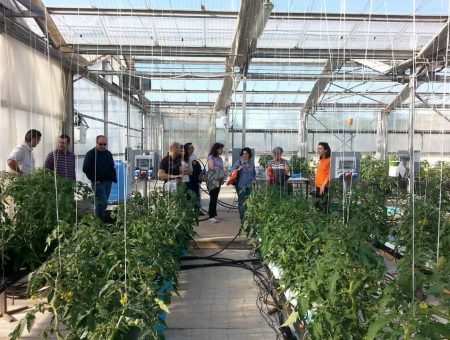Building and Spatial Infrastructure: There are 4 buildings with a total area of 3,500m 2 of which 70% is used for the needs of the Department and the rest for the needs of other Departments, no amphitheater, 5 rooms for 90 students 5 of 40 and 24 offices a meeting room with space for video conference and office space for CoR and the Secretariat of the Department, while in the buildings there are 12 laboratory units. The secretariat of the Department is complete with all the infrastructure, archives and electronics and is housed in a space capable of serving the needs of the Department and consists of three members of the Administrative staff, excellently trained and with excellent relationship with the academic staff and students. These rooms do not have a projector permanently installed.
The infrastructure is all accessible for the disabled and all the buildings have the ability to serve people with mobility difficulties
The campus in Kostaki, Arta has a Farm which includes:
a) Orchard: ΄Area of about 10 acres. It is found in a variety of fruit trees in linear planting, mainly citrus, olives, pears, apples, cherries, sea buckthorn, as well as various other fruit species in smaller numbers. On the farm there is an automatic irrigation system with drippers per tree.
b) Vineyard: An area of one acre. There are installed and supported stumps, mainly of the Debina variety, with automatic irrigation system with drippers.
c) Other outdoor areas of large cultivated plants: Area of about 20 acres. These spaces are available for the cultivation of large annual plants and aromatic-medicinal plants. Practical training of students in the use of agricultural machinery and equipment is carried out in this area.
The automatic water supply systems have suffered some damage due to the weather and need to be repaired.
d) Uncultivated areas (grasslands) with a total area of about 150 acres.
e) Incomplete constructions of livestock units, such as sheepfold, poultry farm, cowshed, milking and cheese-making areas, feed production building and supposed poultry farm and pig farm.
f) Three greenhouse installations, one hydroponic and two crystal conventional, while there are also two seasonal ones with plastic cover
Educational and research crops are carried out on the farm, either as part of undergraduate laboratory courses, or as part of experimental undergraduate or postgraduate work.

The Department of Agriculture is the oldest of the Departments of Arta with a start time of 1985 and its building infrastructure needs maintenance and improvement.
- Maintenance of the building infrastructure of the Department of Agriculture and construction of new infrastructure, upgrading of the classrooms in terms of audiovisual equipment and safety. There is no amphitheater in the Department that serves more than 100 students. The buildings are old, they do not have a recognizable architectural position, their design does not refer to a University institution with scientific osmosis and interaction, but also to a smooth educational process without problems.
- Renewal of the research and educational equipment of the laboratories and mainly maintenance of the existing ones with the aim of their modernization.
- Procurement of special laboratory analytical devices for the modernization of laboratory methods and increase of research competitiveness, especially in areas of the Department that do not converge with any other department of the University of Ioannina.
- Maintenance and upgrading of the functionality of the farm complex and the surrounding area of the Department of Agriculture on the campus in Kostaki, Arta (orchard, vineyard, educational greenhouses, areas of large cultivation plants, other outdoor areas of buildings and training) in the field of modern cultivation techniques with:
- Immediate restoration of damaged plant material and equipment and supply of new (trees, agricultural and irrigation equipment and machinery, greenhouse equipment).
- Employment of permanent staff (land worker) for handling agricultural machinery, so that with the guidance of the competent teachers he can successfully perform the work required for the operation of the farm (indicatively tillage, mowing, pruning, watering, plant protection interventions).
- Modernization of the existing glass hydroponics greenhouse (which in the last 15-20 years has been used in a large number of research experiments that is reflected in many publications). Special and substantial interventions are required for its proper operation.
- Creation of a new glazed model greenhouse, fully equipped with modern logistics infrastructure.
- Voluntary participation of students in the productive process of crops, as well as in the improvement of the environment of all the complexes of the campus by preserving the ornamental plants and planting new ones.
- Complete upgrade of the existing botanical garden and creation of a new one with modern standards with aromatic, medicinal and plants of native flora of the wider area.
- Creation of special innovative infrastructures with productive bodies for the promotion of the agri-food products of the region. The Department can in areas such as citrus cultivation, kiwi, olive and vegetables, which are the main crops of the wider region, contribute decisively to the utilization and dissemination of new varieties more efficient, improved quality, adapted to the soil and climatic conditions of the region and market and industry needs.
- Development of technological / laboratory infrastructures in key sectors of agricultural production, so that the Department is always at the forefront of research data and in the production of new knowledge, directly exploitable by the productive bodies.
- Utilization of the unfinished facilities of the Farm for Animal Production through their completion, with the aim of creating models of special farms for animal husbandry and milk and meat processing for the pioneering design in practice of innovative production systems, combining uniform health, environmentally friendly, animal welfare, the Mediterranean diet, biofoods and precision animal husbandry. The interconnection of the farm with PATEPI for the implementation of the single objectives that have been developed in the present strategic planning.
Research project
